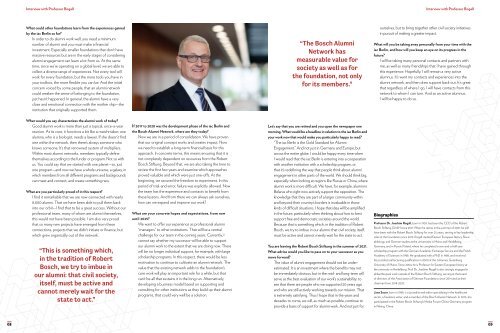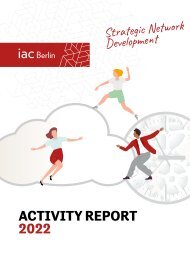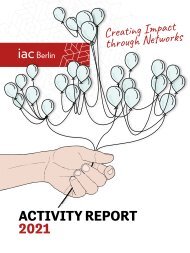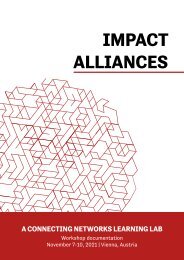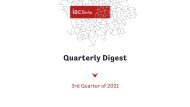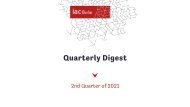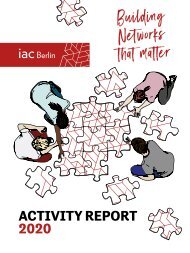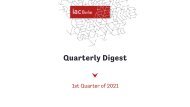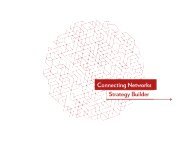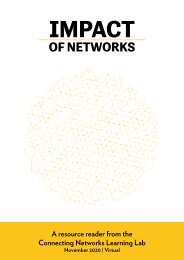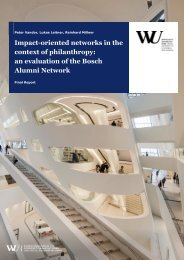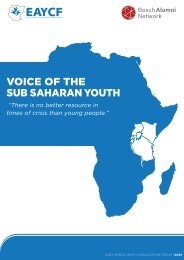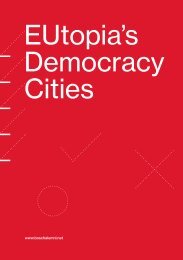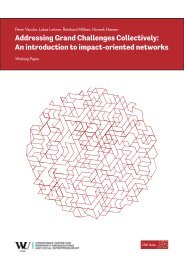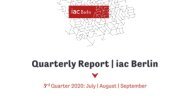iac Berlin - Activity Report 2020: Interview with Professor Rogall
The International Alumni Center Berlin (iac Berlin) and the Bosch Alumni Network lie at the heart of the Robert Bosch Stiftung’s alumni work. As CEO of the Robert Bosch Stiftung, Prof. Dr. Joachim Rogall has been closely involved with the iac Berlin’s work since day one. In this interview, he talks about his passion for alumni engagement, the learning effect, and important lessons that he’s picked up along the way.
The International Alumni Center Berlin (iac Berlin) and the Bosch Alumni Network lie at the heart of the Robert Bosch Stiftung’s alumni work. As CEO of the Robert Bosch Stiftung, Prof. Dr. Joachim Rogall has been closely involved with the iac Berlin’s work since day one. In this interview, he talks about his passion for alumni engagement, the learning effect, and important lessons that he’s picked up along the way.
You also want an ePaper? Increase the reach of your titles
YUMPU automatically turns print PDFs into web optimized ePapers that Google loves.
<strong>Interview</strong> <strong>with</strong> <strong>Professor</strong> <strong>Rogall</strong><br />
<strong>Interview</strong> <strong>with</strong> <strong>Professor</strong> <strong>Rogall</strong><br />
What could other foundations learn from the experiences gained<br />
by the <strong>iac</strong> <strong>Berlin</strong> so far?<br />
In order to do alumni work well, you need a minimum<br />
number of alumni and you must make a financial<br />
investment. Especially smaller foundations that don’t have<br />
massive resources but are in the early stages of considering<br />
alumni engagement can learn a lot from us. At the same<br />
time, since we’re operating on a global level, we are able to<br />
collect a diverse range of experiences. Not every tool will<br />
work for every foundation, but the more tools you have in<br />
your toolbox, the more flexible you can be. And the initial<br />
concern voiced by some people, that an alumni network<br />
could weaken the sense of belonging to the foundation,<br />
just hasn’t happened. In general, the alumni have a very<br />
close and emotional connection <strong>with</strong> the mother ship—the<br />
institution that originally supported them.<br />
“The Bosch Alumni<br />
Network has<br />
measurable value for<br />
society as well as for<br />
the foundation, not only<br />
for its members.”<br />
ourselves, but to bring together other civil society initiatives<br />
in pursuit of making a greater impact.<br />
What will you be taking away personally from your time <strong>with</strong> the<br />
<strong>iac</strong> <strong>Berlin</strong>, and how will you keep an eye on its progress in the<br />
future?<br />
I will be taking many personal contacts and partners <strong>with</strong><br />
me, as well as many friendships that I have gained through<br />
this experience. Hopefully, I will remain a very active<br />
alumnus. It’s want my contacts and experiences into the<br />
alumni network, and then draw support back out. It’s great<br />
that regardless of where I go, I will have contacts from this<br />
network to whom I can turn. And as an active alumnus,<br />
I will be happy to do so.<br />
What would you say characterizes the alumni work of today?<br />
Good alumni work is more than just a typical, once-a-year<br />
reunion. At its core, it functions a bit like a matchmaker: one<br />
alumna, who is a biologist, needs a lawyer. If she doesn’t find<br />
one <strong>with</strong>in the network, then there’s always someone who<br />
knows someone. It’s that renowned system of multipliers.<br />
Within most alumni networks, members typically define<br />
themselves according to the funder or program. Not so <strong>with</strong><br />
us. You could say that we started <strong>with</strong> one planet—so, just<br />
one program—and now we have a whole universe, a galaxy, in<br />
which members from all different programs and backgrounds<br />
can meet and connect, and create something new.<br />
What are you particularly proud of in this respect?<br />
I find it remarkable that we are now connected <strong>with</strong> nearly<br />
8,000 alumni. That we have been able to pull them back<br />
into our orbit—I find that to be a great success. Without our<br />
professional team, many of whom are alumni themselves,<br />
this would not have been possible. I am also very proud<br />
that so many new projects have emerged from these<br />
connections, projects that we didn’t initiate or finance, but<br />
which grew organically out of the network.<br />
“This is something which,<br />
in the tradition of Robert<br />
Bosch, we try to imbue in<br />
our alumni: that civil society,<br />
itself, must be active and<br />
cannot merely wait for the<br />
state to act.”<br />
If 2017 to <strong>2020</strong> was the development phase of the <strong>iac</strong> <strong>Berlin</strong> and<br />
the Bosch Alumni Network, where are they today?<br />
Now we are in a period of consolidation. We have proven<br />
that our original concept works and creates impact. Now<br />
we need to establish a long-term financial basis for this<br />
approach. In concrete terms, this means ensuring that it is<br />
not completely dependent on resources from the Robert<br />
Bosch Stiftung. Beyond that, we are also taking the time to<br />
review the first few years and examine which approaches<br />
proved valuable and which were just one-offs. At the<br />
beginning, we secured the freedom to experiment. In this<br />
period of trial-and-error, failure was explicitly allowed. Now<br />
the team has the experience and contacts to benefit from<br />
these lessons. And from there we can always ask ourselves,<br />
how can we expand and improve our work?<br />
What are your concrete hopes and expectations, from now<br />
until 2025?<br />
We want to offer our experience as professional alumni<br />
“managers” to other institutions. That will be a central<br />
challenge for our team in the coming years. Currently, I<br />
cannot say whether my successor will be able to support<br />
our alumni work to the extent that we are doing now. There<br />
will be no longer individual support, for example, <strong>with</strong> large<br />
scholarship programs. In this respect, there would be less<br />
motivation to continue to cultivate an alumni network. The<br />
value that the existing network adds to the foundation’s<br />
core work will play an important role for a while, but that<br />
can’t be all that sustains it in the long run. Alternatively,<br />
developing a business model based on supporting and<br />
consulting for other institutions as they build up their alumni<br />
programs, that could very well be a solution.<br />
Let’s say that you are retired and you open the newspaper one<br />
morning. What would be a headline in relation to the <strong>iac</strong> <strong>Berlin</strong> and<br />
your work now that would make you particularly happy to read?<br />
“The <strong>iac</strong> <strong>Berlin</strong> is the Gold Standard for Alumni<br />
Engagement.” And not just in Germany and Europe, but<br />
across the entire globe. I would be happy every time when<br />
I would read that the <strong>iac</strong> <strong>Berlin</strong> is entering into a cooperation<br />
<strong>with</strong> another institution <strong>with</strong> a scholarship program, or<br />
that it’s redefining the way that people think about alumni<br />
engagement in other parts of the world. We should think big,<br />
especially when looking at regions like Russia or China, where<br />
alumni work is more difficult. We have, for example, alumni in<br />
Belarus who right now actively support the opposition. The<br />
knowledge that they are part of a larger community <strong>with</strong>in<br />
and beyond their country’s borders is invaluable in those<br />
kinds of difficult situations. I hope that idea will be amplified<br />
in the future, particularly when thinking about how to best<br />
support free and democratic societies around the world.<br />
Because that is something which, in the tradition of Robert<br />
Bosch, we try to imbue in our alumni: that civil society, itself,<br />
must be active and cannot merely wait for the state to act.<br />
You are leaving the Robert Bosch Stiftung in the summer of 2021.<br />
What advice would you like to pass on to your successor as you<br />
move forward?<br />
The value of alumni engagement should not be underestimated.<br />
It is an investment where the benefits may not<br />
be immediately obvious, but in the mid- and long-term will<br />
serve as the best evaluation of our work’s sustainability: to<br />
see that there are people who we supported 20 years ago<br />
and who are still actively working towards our mission. That<br />
is extremely satisfying. Thus I hope that in the years and<br />
decades to come, we will, as much as possible, continue to<br />
provide a basis of support for alumni work. And not just for<br />
Biographies<br />
<strong>Professor</strong> Dr. Joachim <strong>Rogall</strong>, born in 1959, has been the CEO of the Robert<br />
Bosch Stiftung GmbH since 2017. When he retires in the summer of 2021, he will<br />
have been <strong>with</strong> the Robert Bosch Stiftung for over 25 years, serving in key leadership<br />
roles at the foundation since 2013. <strong>Rogall</strong> studied Eastern European history, Slavic<br />
philology, and German studies at the universities in Mainz and Heidelberg,<br />
Germany, and in Posen, Poland, where he completed a one-and-a-half year<br />
scholarship program <strong>with</strong> the German Academic Exchange Service and the Polish<br />
Academy of Sciences in 1988. He graduated <strong>with</strong> a PhD in 1988, and received<br />
his postdoctoral lecturing qualification in 2000 at the Johannes Gutenberg<br />
University of Mainz. Since 2004, he is <strong>Professor</strong> for Eastern European history at<br />
the university in Heidelberg. Prof. Dr. Joachim <strong>Rogall</strong> is also strongly engaged in<br />
philanthropical work outside of the Robert Bosch Stiftung, serving at the board<br />
of directors of the Association of German Foundations since 2014 and as their<br />
chairman from 2018-<strong>2020</strong>.<br />
Jana Sauer, born in 1988, is a journalist and editor specializing in the healthcare<br />
sector, a freelance writer, and a member of the Bosch Alumni Network. In 2015, she<br />
participated in the Robert Bosch Stiftung’s Media Forum China-Germany program<br />
in Peking, China.<br />
08<br />
09


